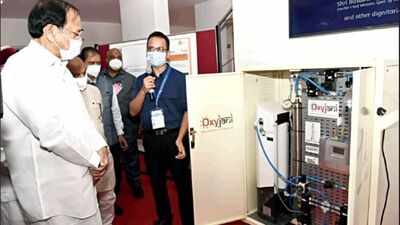Top Searches
- News
- City News
- bengaluru News
- New oxygen concentrator can tackle woes in rural areas
New oxygen concentrator can tackle woes in rural areas

Vice-president Venkaiah Naidu inspecting OxyJani, the new concentrator, at JNCASR in Bengaluru
BENGALURU: Researchers from Jawaharlal Nehru Centre for Advanced Scientific Research (JNCASR) and their collaborators have developed a robust, mobile oxygen concentrator that can be used in rural settings and be rapidly deployed in emergencies in any location.
Pointing out that overcoming the oxygen crisis required two types of solutions — 5-10 litres per minute (lpm) personalised O2 concentrators for home use and 500-lpm plants for large hospitals — researchers say that while plants for hospitals are robust, they cannot be moved around and deployed in resource-poor settings, while personal concentrators are too fragile to be used on a sustained basis in a hospital setting.
The team from JNCASR, an autonomous institution under the department of science and technology (DST), set about addressing these challenges and developed a new solution named ‘OxyJani’.
“OxyJani is based on the principles of pressure swing adsorption (PSA) technology. The team replaced lithium zeolites (LiX) which are usually used in oxygen concentrators, with sodium zeolites which do not generate toxic solid waste and can be manufactured in India,” DST said in a statement.
Vice-president Venkaiah Naidu had inspected OxyJani during his visit to JNCASR in Bengaluru on Monday.
This new technology called “group concentrators” has the robustness of large PSA plants, portability of personal concentrators, and is affordable too, DST said. The device is in the range of 30-40 lpm, which potentially could be used in ICUs.
In this multi-group initiative, SV Diwakar, Meher Prakash, Prof Santosh Ansumali from JNCASR, and collaborators, Prof Arvind Rajendran from the University of Alberta and Arun Kumar (Eiwave Digitech) executed the OxyJani developmental efforts with the help of Ritwik Das (MS student).
“Technical advice was provided by Prof M Eswaramoorthy, Prof Tapas Maji, and Prof Sridhar Rajaraman, while Prof GU Kulkarni, president, JNCASR and Prof Amitabha Bandyophyay of IIT Kanpur mentored developmental efforts. Financial assistance for the prototype was provided through JNCASR and IIT Kanpur. The zeolite material was obtained through a donation from Honeywell UOP, Italy,” DST added.
Pointing out that overcoming the oxygen crisis required two types of solutions — 5-10 litres per minute (lpm) personalised O2 concentrators for home use and 500-lpm plants for large hospitals — researchers say that while plants for hospitals are robust, they cannot be moved around and deployed in resource-poor settings, while personal concentrators are too fragile to be used on a sustained basis in a hospital setting.
The team from JNCASR, an autonomous institution under the department of science and technology (DST), set about addressing these challenges and developed a new solution named ‘OxyJani’.
“OxyJani is based on the principles of pressure swing adsorption (PSA) technology. The team replaced lithium zeolites (LiX) which are usually used in oxygen concentrators, with sodium zeolites which do not generate toxic solid waste and can be manufactured in India,” DST said in a statement.
Vice-president Venkaiah Naidu had inspected OxyJani during his visit to JNCASR in Bengaluru on Monday.
This new technology called “group concentrators” has the robustness of large PSA plants, portability of personal concentrators, and is affordable too, DST said. The device is in the range of 30-40 lpm, which potentially could be used in ICUs.
In this multi-group initiative, SV Diwakar, Meher Prakash, Prof Santosh Ansumali from JNCASR, and collaborators, Prof Arvind Rajendran from the University of Alberta and Arun Kumar (Eiwave Digitech) executed the OxyJani developmental efforts with the help of Ritwik Das (MS student).
“Technical advice was provided by Prof M Eswaramoorthy, Prof Tapas Maji, and Prof Sridhar Rajaraman, while Prof GU Kulkarni, president, JNCASR and Prof Amitabha Bandyophyay of IIT Kanpur mentored developmental efforts. Financial assistance for the prototype was provided through JNCASR and IIT Kanpur. The zeolite material was obtained through a donation from Honeywell UOP, Italy,” DST added.
FacebookTwitterLinkedinEMail
Start a Conversation
end of article

